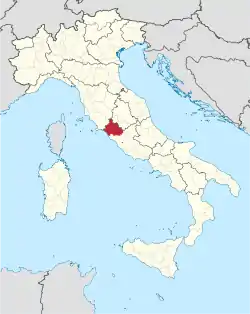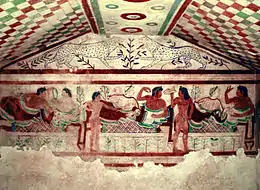Province of Viterbo | |
|---|---|
 Palazzo dei Papi (Palazzo Papale), in Viterbo | |
 Coat of arms | |
 Map with the province of Viterbo, in red, in Italy | |
| Country | |
| Region | Lazio |
| Capital | Viterbo |
| Comuni | 60 |
| Government | |
| • President | Alessandro Romoli (FI) |
| Area | |
| • Total | 3,615.24 km2 (1,395.85 sq mi) |
| Population (30 April 2017)[2] | |
| • Total | 318,163 |
| • Density | 88/km2 (230/sq mi) |
| GDP | |
| • Total | €6.559 billion (2015) |
| • Per capita | €20,425 (2015) |
| Time zone | UTC+1 (CET) |
| • Summer (DST) | UTC+2 (CEST) |
| Postal code | 01100, 010xx |
| Telephone prefix | 0761, 0763, 0766, 06 |
| Vehicle registration | VT |
| ISTAT | 056 |
| Website | Official website |
The province of Viterbo (Italian: provincia di Viterbo) is a province in the Lazio region of Italy. Its capital is the city of Viterbo.[4]
Geography
Viterbo is the most northerly of the provinces of Lazio. It is bordered to the south by the Metropolitan City of Rome Capital and to the south-east by the province of Rieti. It is also bordered by the regions of Tuscany (province of Grosseto) to the north and by Umbria (province of Terni) to the east. The Tyrrhenian Sea is located to the west.[5]
As of 2017, the province has a total population of 318,163 inhabitants over an area of 3,615.24 square kilometres (1,395.85 sq mi), giving it a population density of 89.05 inhabitants per square kilometre. The provincial president is Marcello Meroi and the province contains 60 comuni (SG: comune).[4]
History

The area of the province of Viterbo contained a number of Etruscan cities including Tuscania, Vetralla, Tarquinia, and Viterbo.[6] Viterbo was conquered by the Roman Republic in 310 BCE; despite this, minimal information is known of Viterbo until it was utilised in 773 CE by King of the Lombard Kingdom Desiderius as a base against the Holy Roman Empire. Matilda of Tuscany gifted the city to the papacy in the 11th century. Frederick I, Holy Roman Emperor was based in Viterbo as he planned to invade Rome in 1153, and Frederick I conquered the city in 1160 while preparing to attack Rome.[6]
After a period as a free commune, in the early 13th century Viterbo became part of the Papal States.[6] The Knights of Saint John were expelled from Rhodes in the 16th century and were temporarily granted refuge in Viterbo before they could travel to Malta. Pope Paul III described himself as a citizen of Viterbo and formed a university in the city. It joined the Kingdom of Italy on 12 September 1870 and during World War II, Viterbo was heavily bombed.[6]
Gallery
 Viterbo, Palazzo dei Papi (Palazzo Papale)
Viterbo, Palazzo dei Papi (Palazzo Papale) Panorama of the walls of Civita Castellana
Panorama of the walls of Civita Castellana Tarquinia, wall painting in the Tomb of the Leopards
Tarquinia, wall painting in the Tomb of the Leopards

References
- ↑ "Provincia di Viterbo" (in Italian). Tuttitalia.it. Retrieved 23 February 2017.
- ↑ "Statistiche demografiche ISTAT" (in Italian). Demo.istat.it. Retrieved 10 September 2017.
- ↑ Regions and Cities > Regional Statistics > Regional Economy > Regional Gross Domestic Product (Small regions TL3), OECD.Stats. Accessed on 16 November 2018.
- 1 2 "Provincia di Viterbo". Tutt Italia. Retrieved 19 August 2015.
- ↑ "Viterbo". Italia.it. Retrieved 19 August 2015.
- 1 2 3 4 Roy Palmer Domenico (2002). The Regions of Italy: A Reference Guide to History and Culture. Greenwood Publishing Group. p. 151. ISBN 978-0-313-30733-1.
External links
- Official website (in Italian)
